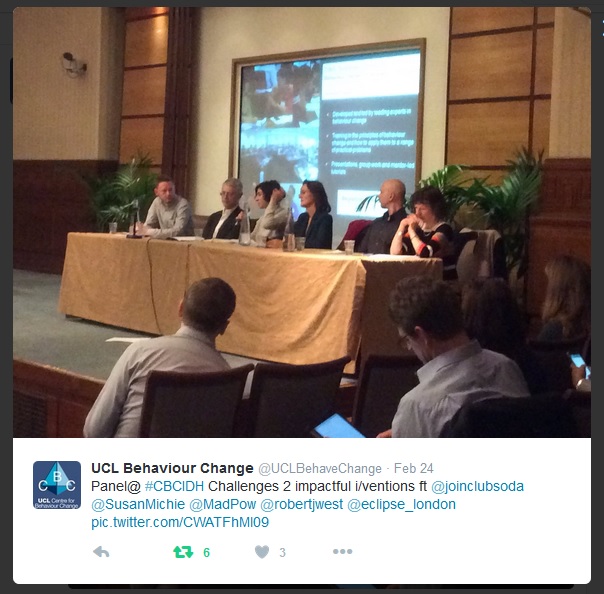Last week saw the second of UCL’s behaviour change conferences, this year subtitled Digital Health & Wellbeing. And quite a bit bigger than last year’s first one. I spoke in a panel on “Challenges to creating sustainable, high impact interventions” (see below), and also had a poster on Club Soda’s Month Off Booze programme (a “prize-nominated poster” no less, though the prize went to someone else…).

Some of the themes that I picked up on over the two days were:
Tailoring of messages – e.g. app prompts, emails, social media messages and so on. The more personalised these can be made, the better the engagement. This may also include personalizing the tools by the users themselves (e.g. adding bookmarks and notes).
Importance of good design – nobody likes an ugly app. Some features divide opinion (e.g. cartoon talking heads), some are not liked by anyone, and sometimes people take you by surprise. For example, German youth much prefer factual information about alcohol harms to “fun” factoids. Well, thinking about this a bit more, perhaps it’s not so surprising that teens don’t find funny the things that public health officials think they should do…
Communities/social support – several interesting projects included some elements of this, and with good results too.
Not just apps – this is one of my personal bugbears, but I did hear other people as well talk about the fact that apps are no longer the only game in town. They may be a part of a bigger intervention, or they may not be included at all. And sometimes the preferred medium is not what you expect at all: in one example, people much preferred text messages to emails, as emails “reminded them of work”(!).
Not just RCTs – a few critical comments on these too. There are alternatives available, which can be much quicker and easier to do.
New recruitment avenues – GumTree was mentioned several times as the source of study participants!
Evaluation of eHealth/mHealth interventions – this research is making progress. A Cochrane review of digital alcohol reduction interventions is nearing completion, with some interesting findings on what seems to work and what doesn’t. I’m really looking forward to reading the full study soon.
Poor engagement levels – an oft-cited figure was the 20% of apps that are only ever used once and then ignored. And very few are used at anything like “frequently”. This creates problems for evaluation as well, as the drop-out rates in some studies can be over 90%.
Dose – again, several speakers mentioned this as an open issue. What is the “dose” of a digital intervention, can it be altered, how to measure it, and does it make a difference?
Qualitative data too! – A fascinating comment by Nikki Newhouse: when she interviewed people about their use of a website, the stories completely contradicted the researchers’ conclusions from the quantitative data. For example, people had seemingly spent lots of time on one page, but had in fact found it so confusing that they had often “gone to make tea instead” and not actually read it at all!
All in all a stimulating two days again, with lots to take away and ponder.